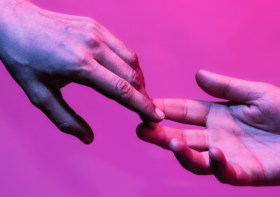Find Your Tribe: Friendships in Your 30s & 40s
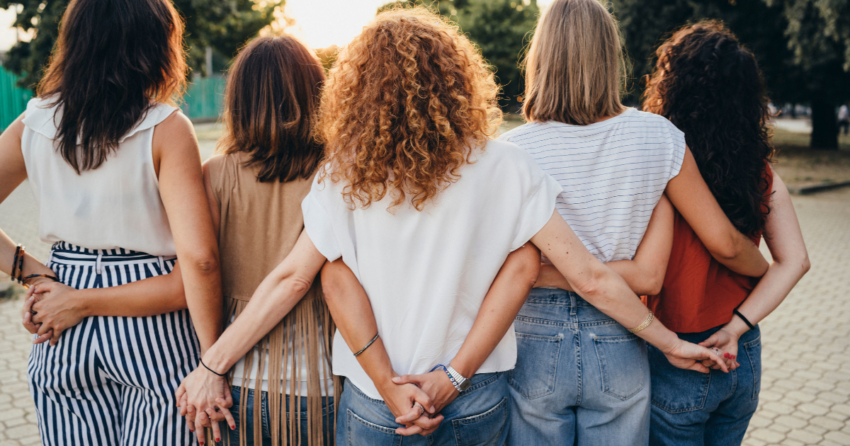
Do you feel lonely trying to keep up with work, love, and family in your 30s and 40s? You’re not alone. The World Health Organization says loneliness is as bad as smoking 15 cigarettes a day. But, having good friends is the secret to happiness and health.
The Harvard Study of Adult Development is the longest study on life. It shows that strong, supportive friendships are key to a happy life. As we get older, making new friends gets harder. But don’t worry, this article will show you how to find your tribe and beat loneliness in your 30s and 40s.
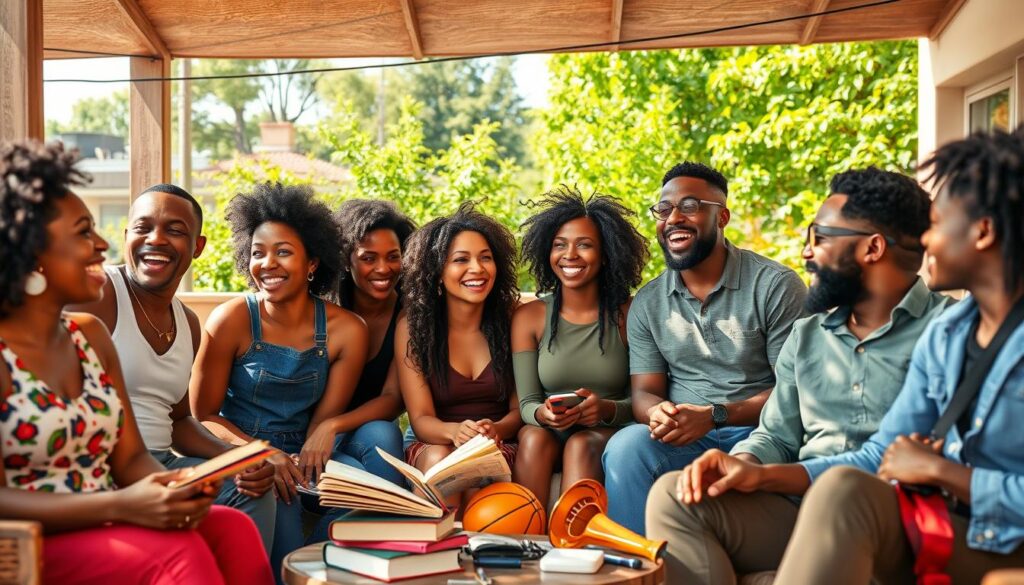
The Loneliness Epidemic and the Importance of Friendships
The World Health Organization calls loneliness a big health problem. It’s as bad as smoking 15 cigarettes a day. People spend less time together now because of work and technology. In our 30s and 40s, friends are key for support and feeling part of a group.
Loneliness as a Health Risk
Loneliness hurts our bodies and minds a lot. It makes heart disease and stroke more likely. It also raises the risk of Alzheimer’s disease. With so many feeling lonely, it’s clear we need good friends.
The Decline of Community Bonds
Friend circles are getting smaller. Fewer men have six close friends now than in 1990. More men don’t have any close friends today than before. Young people also have fewer friends than older generations.
Friendships as a Source of Emotional Support
Friends help us feel supported and connected. Making friends takes effort, but it’s worth it. Good friendships make us happier and help our relationships with family and partners.
| Key Statistic | Insight |
|---|---|
| More than half of Americans report feeling lonely at times. | Loneliness is a widespread issue that affects a significant portion of the population. |
| The percentage of men with at least six close friends has declined from 55% to 27% since 1990. | The size of Americans’ friendship circles has been steadily decreasing over the past few decades. |
| Lonely individuals have a significantly higher risk of heart disease and are more likely to die from stroke. | Loneliness can have serious consequences for physical and mental health. |
“The US Surgeon General has stated that the country is facing an ‘Epidemic of Loneliness.'”
Why Making Friends Feels Challenging in Your 30s and 40s
As we grow older, making friends can get harder. This is because of adulthood challenges like work and family. These things take up a lot of time and energy, leaving little for friends.
When we were kids, making friends was easy. We saw the same people every day. But as adults, it’s harder to find new friends because of shifting priorities and lost friendships.
Studies show that after 25, we lose more friends than we make. This gets worse in our 30s and 40s. Even college-educated people find it hard to keep close friends because they move a lot.
Places like The Atlantic and The Wall Street Journal talk about this problem. They show how hard it is for adults to make friends. Apps like Hey VINA try to help by connecting women for friendship.
Overcoming these making friends in 30s and 40s hurdles takes time and effort. But by trying new things and meeting new people, we can grow and learn more about ourselves.
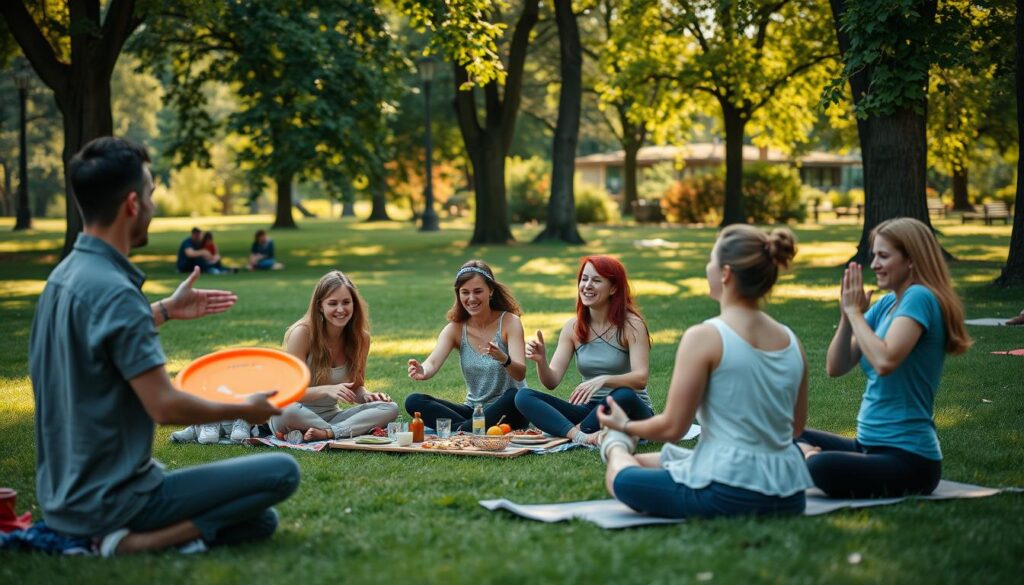
Embrace Your Interests and Expand Your Circle
Finding friends as an adult can be hard. But, loving your hobbies is a great way to meet new people. You can join a sports team, take a cooking class, or find online groups for your favorite TV show. Being around people who like the same things helps you make friends.
Leverage Your Hobbies and Online Communities
Look at what you love to do. Do any of these have groups or online communities? Joining these is a smart move. It lets you meet others who love what you love. Book clubs and hiking groups are great places to make friends.
Attend Events and Use Apps for Making Friends
Going to local events and using apps to make friends is also good. Look for things that match your interests. Talk to others at these events. Apps like Bumble BFF or Meetup can help you find friends nearby.
Being open and real is key to making friends. Love what you do, get involved, and stay open-minded. You can meet lots of new people!
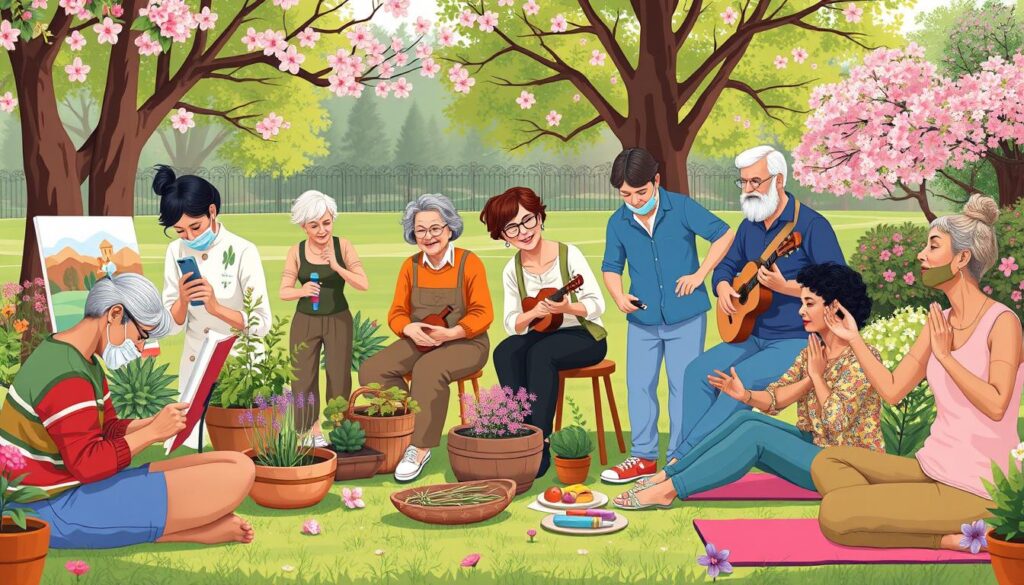
“Friendship is not something you learn in school. But if you haven’t learned the meaning of friendship, you really haven’t learned anything.” – Muhammad Ali
Nurture Existing Connections and Let Go of Draining Friendships
When you’re in your 30s and 40s, making new friends can be tough. But, it’s also key to care for the friendships you already have. Spend time with friends who make your life better, even as your life changes.
It’s okay to say goodbye to friendships that drain you. This helps you focus on the good ones.
Quality of connections is more important than quantity. Aim for deep, supportive friendships over many shallow ones. This might be hard, but it’s worth it, says Kevin Darné, a relationship expert.
Laurel Roberts-Meese, a therapist, suggests structuring your social life. This helps you keep in touch with important friends. It also lets you say goodbye to friends who don’t fit anymore.
“Making new friends as an adult can be challenging. Social media can make you feel lonely. Starting over in a new city can be scary.”
Not every friend you try to reach out to will want to be friends. But don’t give up. Keep trying to find meaningful friendships. This way, you’ll have a quality over quantity circle of friends that supports you.
| Nurture Existing Friendships | End Draining Friendships |
|---|---|
|
|
How To Make Friends In Your Late 20’s, 30’s, & 40’s
Making new friends as an adult can seem hard. But, with the right mindset and strategies, you can find friends in your 20s, 30s, and 40s. Start by stepping out of your comfort zone. Try going to local events or visiting community spaces by yourself.
This helps you get used to being social on your own. It also increases your chances of meeting people who share your interests.
Take Yourself on Solo Dates
Don’t be shy to explore your interests alone. Try new restaurants, go to concerts, or visit museums. These solo dates make you more open to meeting new people.
The more you go out, the more chances you have to find friends.
Volunteer Locally
Volunteering is a great way to meet people who share your values. Look for local opportunities like helping at a food bank or animal shelter. You’ll make a difference and meet others who care about the same things.
Host Dinners and Organize Park Hangouts
Hosting dinner parties or park hangouts can help you make friends. Invite people you know and new friends. This lets everyone get to know each other in a relaxed setting.
These gatherings help you start new friendships. They also give you a chance to have deep conversations.
Remember, making friends as an adult takes work. But by following your interests and being open, you can find a supportive community. This will make your life in your 20s, 30s, and 40s richer.
“The biggest ingredient in being able to make new friends as an adult is putting yourself out there. It’s about being vulnerable and taking that first step to connect with someone new.”
Overcoming Challenges and Building a Supportive Community
As you get older, making new friends can be tough. Work and family take up a lot of time. But, you can still find friends and grow by trying new things.
Many people move a lot in their 30s and 40s. This can break old friendships and make new ones hard. Use your friends’ networks to meet new people. Go to local events and join groups to find friends.
Friendships change as you get older. Some fade, but others grow stronger. Be open to new friends and activities. This can help you make lasting connections.
| Friendship Challenges | Strategies for Success |
|---|---|
| Limited time and energy due to life demands | Prioritize social interactions, even if it’s a simple catch-up call or a casual get-together |
| Shifting priorities and the dissolution of old connections | Embrace change, nurture new relationships, and find common ground with diverse individuals |
| Difficulty meeting new people due to relocation and life transitions | Leverage your existing network, attend local events, and utilize online platforms to expand your circle |
Being proactive and open-minded is key to finding friends. Follow your interests and enjoy activities. This way, you can find your tribe and have a happy social life.
“The greatest gift you can give to others is the gift of unconditional love and acceptance.” – Brian Tracy
Conclusion
Friendships are key for our health and happiness. But making new friends can be tough in our 30s and 40s. We can find friends by doing things we love, joining online groups, going to local events, and caring for our friendships.
It’s more important to have good friends than many friends. Look for people who make your life better. Let go of friends who make you feel bad.
By working hard and being open, you can find friends who will support you. Loneliness is a big problem, with 3 out of 5 Americans feeling lonely. But, by focusing on your friendships, you can stay healthy and happy.



